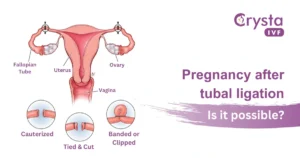Around 1.28 billion people between the ages of 30-79 across the globe suffer from hypertension, and shockingly, 46% of adults are unaware that they have this condition. High blood pressure is often associated with cardiovascular issues, but it also significantly impacts the reproductive system, affecting fertility and pregnancy.
You must be wondering how hypertension affects fertility. How do you know if you are hypertensive? Is it causing difficulty in conceiving?
Let’s unveil the influence of hypertension on reproductive health and know the measures to be taken when planning to have a baby.
How Hypertension Impacts Fertility In Men and Women?
Hypertension is a silent killer. While it doesn’t show symptoms, it can lead to serious health concerns if left untreated. Studies highlight that hypertension has reduced fertility in both men and women.
Hypertension is a condition in which the pressure of the blood pumped by the heart is too high, exerting excessive force on the arteries. 120/80 is considered normal, but when this increases, it can lead to major health concerns.
In women, high blood pressure (BP) affects the quality of the eggs, impacts ovulation, and enhances the risk of miscarriage and preeclampsia, a pregnancy complication due to hypertension that can have serious health consequences both for the mother and the baby. It can damage other organs such as the lungs, heart, kidneys, and eyes, leading to strokes or complications in the brain.
Studies have shown that women with hypertension are at a higher risk of infertility. Factors such as age, dietary habits, and lifestyle have a significant impact on the reproductive health of women.
Related blog: Top Factors Reducing Fertility in Women
In men, high BP can lead to erectile dysfunction, affect sperm motility, and reduce sperm count. It can damage the testes, affecting hormone and sperm production. A low sperm count can complicate pregnancy.
High blood pressure can pose many challenges, such as premature delivery, restricting the growth of the fetus, and leading to miscarriages, but these concerns can be managed with proper guidance and treatment. You can get pregnant and have a baby even if you have high BP.
Crysta IVF, with state-of-the-art facilities across the country, aims to provide high-quality fertility care through personalized treatment plans and counseling sessions from highly experienced fertility specialists that help you monitor your health, reduce health risks, and take charge of hypertension through the right medications. Proper treatment can help you fulfill your dreams of parenthood.
What causes Gestational Hypertension?
Some common factors that can complicate your pregnancy by increasing your blood pressure levels are:
- Weight gain or obesity
- Excessive consumption of alcohol
- Smoking
- A sedentary lifestyle
- Stress
- Family history of hypertension
Checking your blood pressure will help you monitor it and make lifestyle modifications, especially when planning to start a family. A fertility specialist, through proper guidance and medications, helps you take charge of your health, increasing your chances of conception.
Recognizing the Symptoms of Gestational Hypertension
During pregnancy, it is essential to keep a keen eye on the functioning of your body. If you notice these symptoms, consult your doctor without delay.
- Problems with urinating
- Abdominal pain
- Nausea and vomiting
- Issues with the vision
- Abnormalities in the liver and kidney
Stay alert and take charge of your well-being.
Complications of Hypertension during Pregnancy
High BP can lead to:
- Premature Birth
- Preeclampsia
- Stillbirth
- Improper growth of the fetus
- Low birth weight
- Pregnancy complications
Hypertension can affect fertility, but you can still conceive naturally or through assisted reproductive technology procedures. Seek guidance and make informed decisions about your pregnancy.
Proper Medications for Fertility
Taking medications to control your BP is essential, but some of these medications can have serious implications for your fertility by reducing the flow of blood to the uterus, affecting implantation, and making it difficult to conceive.
Some antihypertensives are safe for consumption and effectively manage BP levels without affecting the reproductive system or fertility. If you are planning for pregnancy, it is advisable to first consult a fertility specialist and take proper guidance and medicines that will boost your fertility.
Managing hypertension for fertility
Making lifestyle changes, managing stress, consuming a balanced diet, taking medications, and monitoring blood pressure levels can help manage this condition. If this condition leads to complications in pregnancy or causes infertility, then procedures such as in vitro fertilization and intrauterine insemination are alternatives that have made it possible for couples to conceive and fulfill their dreams of parenthood.
IVF treatment have resulted in successful implantation, ovulation, and pregnancy outcomes through proper management of the complications.
Sometimes the outcomes might not be as desired, but there is hope. Constant consultation and careful monitoring can help fertility specialists provide personalized treatment based on the medical requirements of the couple.
Conclusion
With advancements in technology, there are opportunities and hope for couples planning to be parents. Making the right decision, choosing the correct IVF center to avail of treatment from for your family planning, and being perseverant while undergoing the process are crucial for successful outcomes.
Connect with Crysta IVF and understand how you can take charge of your reproductive health. We strive for excellence in our service by using the latest technology that maximizes the chances of pregnancy by minimizing risk factors. The team of empathetic professionals is committed to helping couples in their journey to parenthood.




